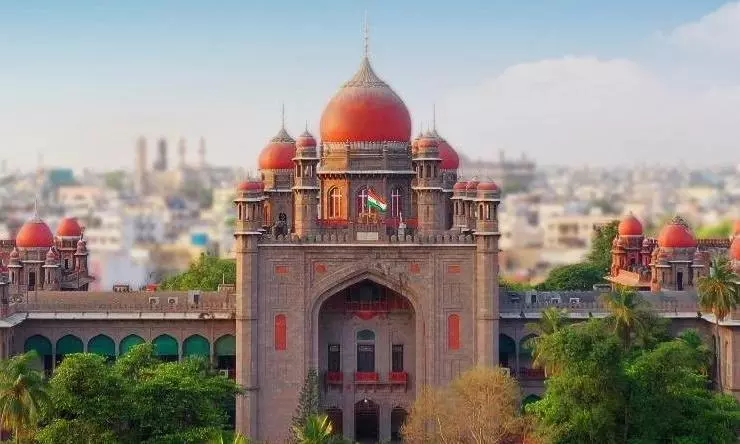Pension benefit cut-off date okay: Telangana HC
Retirees between July 1, 2018, and March 31, 2020, were excluded from these monetary benefits, leading to allegations of arbitrary classification under Article 14 of the Constitution

Hyderabad: A two-judge panel of the Telangana High Court comprising acting Chief Justice Sujoy Paul and Justice Renuka Yara dismissed a batch of writ appeals challenging the cut-off date prescribed for the disbursement of revised pension benefits, citing financial constraints as a constitutionally valid consideration. The panel was dealing with a writ appeal filed by retired government employees. The dispute arose from Government Orders (GO) Ms No.s 55 and 56, issued on June 11, 2021, which revised the pension scheme for retired employees.
While the revised pension was applied notionally from July 1, 2018, the actual monetary benefits, including gratuity and encashment of earned leave, were restricted to those retiring after April 1, 2020. Retirees between July 1, 2018, and March 31, 2020, were excluded from these monetary benefits, leading to allegations of arbitrary classification under Article 14 of the Constitution. The appellants argued that all pensioners form a homogeneous class, and the cut-off date created an unconstitutional division. Counsel for the appellant heavily relied on rulings of the Supreme Court, including ‘All Manipur Pensioners Association v. State of Manipur (2020)’ and ‘D.S. Nakara v. Union of India (1983)’, which emphasised equal treatment for pensioners. The government defended the decision citing financial constraints as a valid reason for the cut-off date. Speaking for the panel, acting Chief Justice Sujou Paul said, "Financial constraints can be a valid consideration for prescribing a cut-off date." The panel drew a line between those precedents and the current case, emphasising that the Supreme Court consistently recognised financial burden as a legitimate basis for fixing a cut-off date, especially when implementing revised pay or pension schemes. The panel accordingly dismissed the writ appeals.
Medical college seeks more MBBS seats
Justice B. Vijaysen Reddy of Telangana High Court will hear a writ plea filed by a medical college challenging the decision of Kaloji Narayana Rao University of Health Sciences in rejecting its request for consent of affiliation for enhancement of 100 MBBS seats. The judge was dealing with a writ plea filed by CMR Institute of Medical Sciences and Hospital. The petitioner contended that the rejection was communicated through a letter wherein the university insisted on the production of an essentiality certificate as a precondition for granting consent. The petitioner contended that the insistence on an essentiality certificate was illegal and contrary to the amended regulations of the Medical Council of India (MCI) issued in July 2018 and the notification of December 2023, issued by the National Medical Commission (NMC). The petitioner argued that it was ready and willing to pay the prescribed fees and that the university’s rejection was arbitrary, unjust, discriminatory, and violative of the Constitution. The petitioner sought a direction to the university to accept the requisite fees and issue consent of affiliation without insisting on an essentiality certificate. The judge posted the matter for further hearing.
Chit fund officer gets relief from HC
Justice Juvvadi Sridevi of Telangana High Court quashed criminal proceedings against a verification officer in connection with a cheating case related to a scam involving Sri Sai Venkateswara Chit Funds Private Limited. The judge allowed the criminal petition filed by Regatte Gopal Reddy seeking to quash the proceedings pending before the Judicial First Class Magistrate at Suryapet, Nalgonda district. An FIR was registered against the petitioner at the Nakrekal police station for the offence of cheating and dishonesty under provisions of the Indian Penal Code. The petitioner contended that he was falsely implicated and had no role in the alleged misappropriation. The petitioner contended that his duties were limited to verifying the credentials of chit prize winners and that he possessed no financial, administrative or decision-making authority in the company. The petitioner contended that he was also a victim, having not received his salary for several months. The judge observed that the chargesheet lacked specific allegations of dishonest or fraudulent intent against the petitioner, which were essential to constitute an offence of cheating under the IPC. The judge held that continuing proceedings against him would amount to an abuse of the legal process and quashed the proceedings.
HC takes up plea by contract lecturers
Justice Pulla Karthik of the Telangana High Court took on file a writ plea challenging the non-regularisation of services of nine contract Urdu junior lecturers. The judge was dealing with a writ petition filed by Md Raheem and eight others who said that with over 15 years of service in government junior colleges, they were being unfairly excluded from a government order that regularised 2,532 contract lecturers in May 2023. The bone of contention lay in a 2022 memo that made Urdu the second language during graduation a mandatory criterion — a requirement the petitioners did not meet at the time of their appointment. They contended that applying this rule retrospectively was unjust, especially after their long and unblemished service. The government contended that qualification norms cannot be relaxed. Citing past APPSC recruitment notifications, the government argued that allowing exceptions would create inequality among teachers and violate established recruitment rules. A division bench judgment was also referenced, stating that contract employees cannot be regularised if they fail to meet prescribed qualifications. The judge directed the state to file its response by the next date of hearing.
